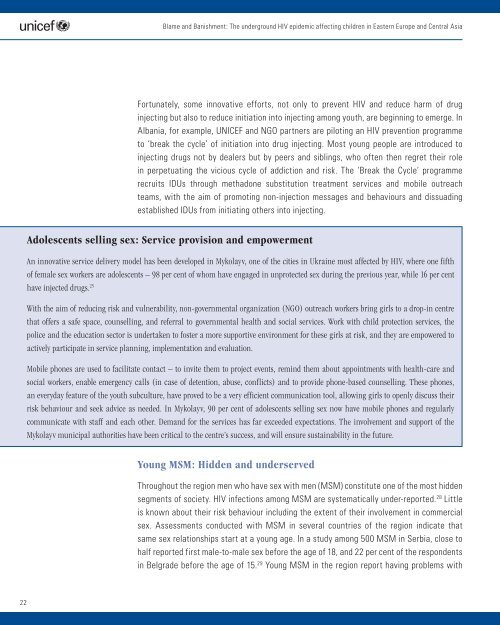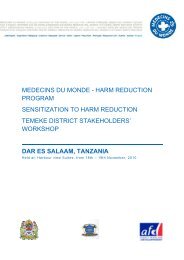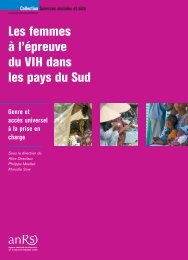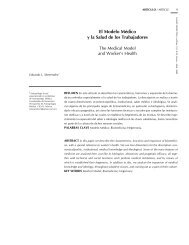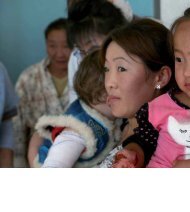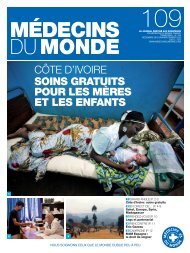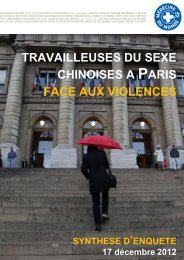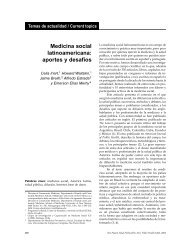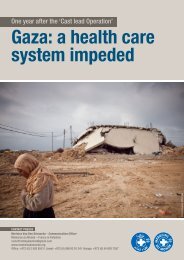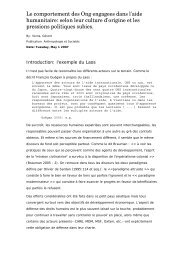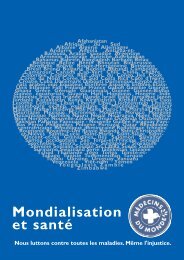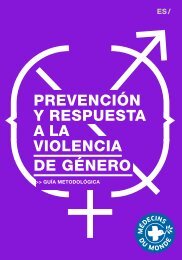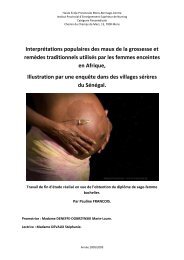Blame & Banishment - Médecins du Monde
Blame & Banishment - Médecins du Monde
Blame & Banishment - Médecins du Monde
You also want an ePaper? Increase the reach of your titles
YUMPU automatically turns print PDFs into web optimized ePapers that Google loves.
<strong>Blame</strong> and <strong>Banishment</strong>: The underground HIV epidemic affecting children in Eastern Europe and Central Asia<br />
Fortunately, some innovative efforts, not only to prevent HIV and re<strong>du</strong>ce harm of drug<br />
injecting but also to re<strong>du</strong>ce initiation into injecting among youth, are beginning to emerge. In<br />
Albania, for example, UNICEF and NGO partners are piloting an HIV prevention programme<br />
to ‘break the cycle’ of initiation into drug injecting. Most young people are intro<strong>du</strong>ced to<br />
injecting drugs not by dealers but by peers and siblings, who often then regret their role<br />
in perpetuating the vicious cycle of addiction and risk. The ‘Break the Cycle’ programme<br />
recruits IDUs through methadone substitution treatment services and mobile outreach<br />
teams, with the aim of promoting non-injection messages and behaviours and dissuading<br />
established IDUs from initiating others into injecting.<br />
Adolescents selling sex: Service provision and empowerment<br />
An innovative service delivery model has been developed in Mykolayv, one of the cities in Ukraine most affected by HIV, where one fifth<br />
of female sex workers are adolescents – 98 per cent of whom have engaged in unprotected sex <strong>du</strong>ring the previous year, while 16 per cent<br />
have injected drugs. 25<br />
With the aim of re<strong>du</strong>cing risk and vulnerability, non-governmental organization (NGO) outreach workers bring girls to a drop-in centre<br />
that offers a safe space, counselling, and referral to governmental health and social services. Work with child protection services, the<br />
police and the e<strong>du</strong>cation sector is undertaken to foster a more supportive environment for these girls at risk, and they are empowered to<br />
actively participate in service planning, implementation and evaluation.<br />
Mobile phones are used to facilitate contact – to invite them to project events, remind them about appointments with health-care and<br />
social workers, enable emergency calls (in case of detention, abuse, conflicts) and to provide phone-based counselling. These phones,<br />
an everyday feature of the youth subculture, have proved to be a very efficient communication tool, allowing girls to openly discuss their<br />
risk behaviour and seek advice as needed. In Mykolayv, 90 per cent of adolescents selling sex now have mobile phones and regularly<br />
communicate with staff and each other. Demand for the services has far exceeded expectations. The involvement and support of the<br />
Mykolayv municipal authorities have been critical to the centre’s success, and will ensure sustainability in the future.<br />
Young MSM: Hidden and underserved<br />
Throughout the region men who have sex with men (MSM) constitute one of the most hidden<br />
segments of society. HIV infections among MSM are systematically under-reported. 28 Little<br />
is known about their risk behaviour including the extent of their involvement in commercial<br />
sex. Assessments con<strong>du</strong>cted with MSM in several countries of the region indicate that<br />
same sex relationships start at a young age. In a study among 500 MSM in Serbia, close to<br />
half reported first male-to-male sex before the age of 18, and 22 per cent of the respondents<br />
in Belgrade before the age of 15. 29 Young MSM in the region report having problems with<br />
22


